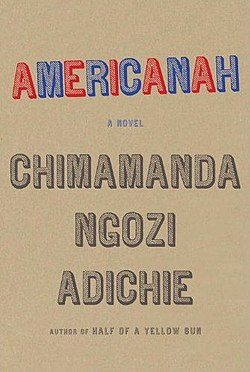 Book cover, 2013 | |
| Author | Chimamanda Ngozi Adichie |
|---|---|
| Language | English |
| Genre | Fiction |
| Publisher | Alfred A. Knopf |
Publication date | 14 May 2013 |
| Publication place | Nigeria |
| ISBN | 978-0-307-96212-6 |
Americanah is a 2013 novel by Chimamanda Ngozi Adichie. Her third novel and fourth book, it was published on 14 May 2013 by Alfred A. Knopf. The novel recounts the story of a young Nigerian woman, Ifemelu, who emigrates to the United States to attend a university. It won the National Book Critics Circle Award for Fiction in 2013.
Contents
- Background
- Plot summary
- Characters
- Reception
- Critical reviews
- Awards and nominations
- Legacy
- Censorship
- Adaptations
- See also
- References
- Sources
- External links
The novel was the story of a young Nigerian woman and her male schoolmate, who had not studied the trans-Atlantic slave trade in school and had no understanding of the racism associated with being Black in the United States or class structures in the United Kingdom. [1] [2] It explores the central message of a "shared Black consciousness", as both of the characters – one in Britain and the other in America – experience a loss of identity when they try to navigate their lives abroad. [2] A commercial success upon publication, French media company France 24's 2015 report shows Americanah has sold more than 500,000 copies in the US and has been translated into 25 languages.